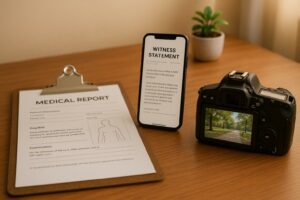Filing an insurance claim? Avoid these 7 common mistakes that could reduce your payout:
- Not Reading Your Policy: Understand what’s covered and any limitations.
- Delaying Medical Care or Filing: Act quickly to document injuries and file claims within deadlines.
- Poor Record Keeping: Keep detailed records – photos, receipts, medical bills, and communication logs.
- Providing Incorrect or Incomplete Details: Double-check timelines, injury details, and all claim forms for accuracy.
- Disposing of Damaged Property Too Early: Document damage and wait for an adjuster before making changes.
- Overlooking Expenses: Track all costs, including medical travel, lost wages, and temporary housing.
- Accepting the First Offer: Negotiate to ensure a fair settlement.
Pro Tip: Keep a dedicated folder (digital or physical) to organize all documents. Need help? Consult a professional to strengthen your case.
1. Not Reading Your Insurance Policy
Skipping over your insurance policy can be a costly mistake when filing a claim. Many people only realize their coverage limitations after submitting a claim, which can lead to smaller payouts or outright denials.
Insurance policies can be tricky to navigate, but knowing the details is crucial. Pay close attention to:
- What’s covered, what’s not, and any limitations that could impact your payout.
Take the time to read your policy carefully. Highlight anything confusing and reach out to your insurance agent for clarification. Understanding your policy upfront can save you from expensive surprises later.
If you need legal advice to better understand your policy or protect your rights, you can contact Ocala Injury Law (https://ocalainjurylaw.com).
2. Waiting Too Long for Medical Care or Filing
Delays in seeking medical care or filing an insurance claim can hurt your chances of getting the compensation you deserve. Insurance companies often question the seriousness of injuries if there’s no immediate action.
Why Timing Matters for Medical Care
Getting medical attention right away does two key things:
- Documents your injuries early: This creates a clear medical record.
- Links your injuries to the incident: It’s harder for insurers to dispute the cause.
If you wait too long, insurers might argue:
- Your injuries aren’t as severe as you claim.
- The injuries happened after the incident.
- You didn’t take reasonable steps to minimize the damage.
Don’t Miss Filing Deadlines
Failing to file your claim on time can lead to denial, reduced payouts, or extra scrutiny. Insurers may demand more paperwork, making the process even harder.
Keep Detailed Records
Here’s what you should document:
- The date and time of the incident.
- Your first medical visit and all follow-ups.
- Any communication with your insurance company.
Insurance companies rely heavily on how quickly and thoroughly you act. Prompt action and clear records make it easier to negotiate fair compensation.
If you’re unsure about deadlines or what to document, Ocala Injury Law can guide you. They’ll help ensure you meet all requirements and build a solid case for your claim.
Up next: how poor record-keeping can weaken your claim.
3. Missing or Poor Record Keeping
Incomplete records can seriously hurt your settlement. Without proper documentation, insurance companies might question your claim or even deny it altogether.
What You Should Document
Make sure your claim file includes the following:
- Photos and videos of damage, ideally with timestamps
- Medical bills and treatment records
- Repair estimates and invoices
- Witness statements and contact details
- Police or incident reports
- All communication with insurance companies
- Proof of lost wages or income
- Receipts for out-of-pocket expenses
Mistakes to Watch Out For
-
Not Taking Enough Photos
- Take pictures from multiple angles, including both close-ups and wide shots.
- Use date stamps if possible.
- Don’t forget to document any pre-existing damage.
-
Disorganized Medical Records
- Keep a chronological log of all visits and treatments.
- Save prescriptions and treatment plans.
- Hold on to follow-up care instructions.
-
Missing Communication Logs
- Always note claim reference numbers and the names of representatives you speak with.
- Save emails and other written correspondence.
- Write down details from phone calls, including dates and times.
Tips for Digital Record Keeping
Set up a digital folder system for easy access:
- Use cloud storage for backup.
- Scan documents immediately and name files consistently.
- Create subfolders for categories like medical records, invoices, and communication logs.
Storing Physical Documents
Keep hard copies safe and organized:
- Use a waterproof and fireproof container.
- Sort documents by date, category, claim reference number, or source.
Having strong records can greatly improve your position during negotiations. Whether digital or physical, well-organized documentation ensures nothing gets overlooked. If managing records feels like too much, Ocala Injury Law can assist in organizing everything for you. Next, let’s look at how incorrect or incomplete details can also weaken your claim.
4. Giving Wrong or Incomplete Details
Providing incorrect or incomplete information can jeopardize your claim. Just like keeping detailed records is crucial, ensuring accurate reporting strengthens your case with insurance adjusters.
Common Mistakes to Avoid
-
Incorrect Timeline Details
Mistakes in reporting when events occurred can hurt your claim. Be precise about:- When the incident happened
- When the damage was discovered
- When authorities were contacted
- When medical treatment began
- When the insurer was notified
-
Not Disclosing Pre-existing Conditions
Failing to mention prior issues can lead to problems. Be upfront about:- Previous injuries
- Past property damage
- Any repairs made
- Earlier insurance claims
-
Inconsistent Statements
Conflicting information across documents can weaken your case. Ensure consistency in:- Police reports
- Medical records
- Claim forms
- Witness accounts
- Repair estimates
Tips for Accurate Reporting
To avoid these common errors, follow these steps:
-
Keep Detailed Records
Write down everything about the incident as soon as possible. Include specific dates and times, and double-check details across all documents. -
Be Thorough with Medical Information
Make a complete list of:- Symptoms and affected areas
- Any pre-existing conditions
- All healthcare providers involved
- Changes in your condition over time
Get Professional Help
Mistakes in your claim details can lead to reduced payouts or even denials. If you’re unsure about how to proceed, professional guidance can make all the difference. Ocala Injury Law specializes in ensuring your claim is accurate and complete, helping you avoid costly errors.
Accurate information is key to building a strong claim and securing the settlement you deserve.
sbb-itb-68ed374
5. Early Property Changes or Disposal
Changing or getting rid of damaged property too soon can hurt your insurance claim. Insurers need to evaluate the damage thoroughly before making decisions. Just like keeping accurate records and acting promptly, holding onto damaged property is key to ensuring a fair settlement.
When to Hold Off
Before making any changes to damaged property, follow these steps:
-
Take Photos First
Snap pictures of all the damage from different angles. Include close-ups and wide shots to show the full context. -
Wait for the Adjuster’s Visit
Let your insurance adjuster inspect the damage in person. Their review ensures everything is properly documented. -
Keep Damaged Items
Even if something looks beyond repair, don’t throw it away. These items help the adjuster confirm the extent of the damage, the original condition, and whether repairs or replacements are needed.
Emergency Repairs
If immediate action is required to prevent further damage, here’s what to do:
-
Document Before Repairing
Take pictures of the damage before starting any emergency fixes. -
Save Removed Materials
Hold onto anything removed during the repair process as evidence for your claim. -
Log All Expenses
Keep receipts and records of any emergency repair costs to support your claim for additional expenses.
Storing Damaged Items Safely
If you need to move damaged items, store them in a clearly labeled, accessible spot. Take photos of the items in their new location to ensure everything is well-documented.
Get Expert Help
Not sure how to handle damaged property during your claim? Reach out to professionals who can guide you. For instance, Ocala Injury Law can assist in preserving evidence that’s critical to your case.
6. Not Recording All Costs and Losses
Overlooking certain expenses when filing an insurance claim can significantly impact your settlement. While major costs often get attention, smaller, recurring expenses can be just as important and should not be ignored.
Expenses You Should Track
-
Health-Related Costs
- Prescription medications
- Medical equipment rentals
- Travel to and from appointments
- Parking fees at medical facilities
- Over-the-counter supplies
-
Property Damage Costs
- Temporary repairs
- Storage fees for damaged items
- Cleaning services
- Debris removal
- Professional inspections
-
Daily Living Adjustments
- Alternative transportation
- Temporary housing
- Increased utility bills
- Extra childcare expenses
- Lost wages due to claim-related activities
Tracking these costs ensures nothing is left out when filing your claim.
How to Stay Organized
1. Leverage Digital Tools
- Snap photos of all receipts.
- Use spreadsheets or expense-tracking apps to log costs.
2. Sort by Category
- Group expenses by type (e.g., medical, property, daily living).
- Include dates, payment methods, and brief descriptions.
- Keep both original and digital copies of receipts.
3. Track Your Time
- Record time off work due to claim-related tasks.
- Log travel time for appointments.
- Keep notes on phone calls and meetings regarding your claim.
Expense Tracking Example
| Category | Details | Documents |
|---|---|---|
| Medical | Date, provider, service, cost | Bills, receipts, prescriptions |
| Property | Item, damage type, cost | Photos, repair estimates |
| Additional | Date, type, amount | Receipts, invoices, time logs |
Consider Professional Guidance
If your claim feels overwhelming, consulting professionals like Ocala Injury Law can help you identify overlooked expenses and ensure everything is documented properly.
Commonly Missed Expenses
- Mileage for claim-related travel
- Home modifications due to injuries
- Fees for professional consultations
- Mental health treatment costs
- Storage fees for personal property
- Temporary housing or living arrangements
7. Accepting the First Offer Without Negotiation
Insurance companies typically start with a low initial settlement offer to leave room for negotiation. If you accept this first offer without pushing back, you could end up with a much smaller payout than you deserve.
Not sure what your claim is worth? It’s always a good idea to get tailored legal advice. Ocala Injury Law provides free consultations and personalized support to help you with your personal injury case. Here’s a quick summary of these common mistakes and how to address them effectively.
Quick Reference: Mistakes and Solutions
Here’s a summary of common mistakes that can affect your claim payout and how to address them:
| Mistake | Impact on Claim | Solution |
|---|---|---|
| Not Reading Your Policy | Overlooking key details or deadlines can lead to claim denials | Carefully review your policy and note deadlines, coverage limits, and exclusions |
| Delayed Medical Care | Waiting too long can reduce compensation and raise doubts about injury severity | Get medical attention quickly – ideally within 24–48 hours – and stick to your treatment plan |
| Poor Documentation | Lack of evidence can lead to low settlement offers | Keep thorough records, including photos, medical bills, and repair estimates, all organized by date |
| Incorrect or Incomplete Details | Mistakes can delay processing or hurt your credibility | Double-check all submitted information and update any changes promptly |
| Early Property Changes or Disposal | Altering or discarding damaged items can destroy critical evidence | Document all damage and keep items until an adjuster has reviewed them |
| Incomplete Cost Records | Missing expense details can undervalue your claim | Track every cost, such as mileage, lost wages, and incidental expenses |
| Accepting the First Offer | Early settlements often result in lower payouts | Research the value of your claim, prepare negotiation points, and consider consulting an attorney |
For personal injury claims, keeping an injury journal and collecting witness statements can strengthen your case during negotiations. If you’re unsure about your claim or need guidance, reach out to Ocala Injury Law (https://ocalainjurylaw.com) for a free consultation and personalized advice.
Pro Tip: Use a dedicated folder – either physical or digital – to organize documents by date and category. This will make it easier to stay on top of your claim.
Next Steps
Now that you’re aware of the common mistakes, here are some steps you can take to improve your claim outcome.
Start Documenting Everything
Set up a digital folder or physical file to keep track of all your expenses, communications, and updates related to the claim. Having organized records can make a big difference.
Check Your Current Claim Status
Take a close look at where your claim stands and identify any issues that might need attention. Be sure to gather supporting evidence, such as:
- Medical records
- Photos of injuries or property damage
- Receipts for out-of-pocket expenses
- Witness statements
Once you have a clear picture of your claim, consider getting professional help.
Get Professional Advice
Reach out to Ocala Injury Law for help reviewing your claim and negotiating on your behalf. Their team can:
- Go through your claim documentation
- Spot opportunities to strengthen your case
- Fix any filing mistakes
- Handle negotiations with insurance companies
Act Quickly on Time-Sensitive Tasks
- Request any missing documents
- File any incident reports that haven’t been submitted
- Schedule necessary medical evaluations
- Contact witnesses while their memories are still fresh
Taking these steps can help you avoid the mistakes mentioned earlier. Ocala Injury Law also offers free consultations to assess your case and provide tailored advice to help you maximize your claim.




